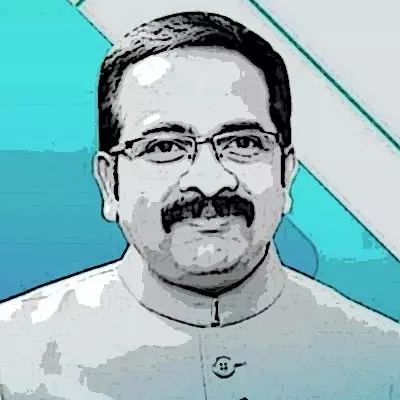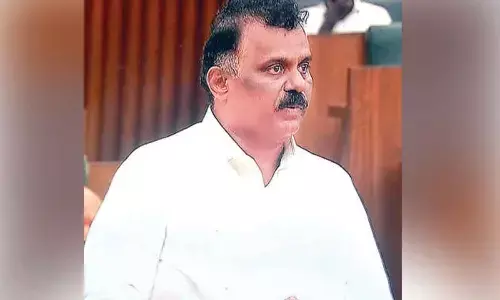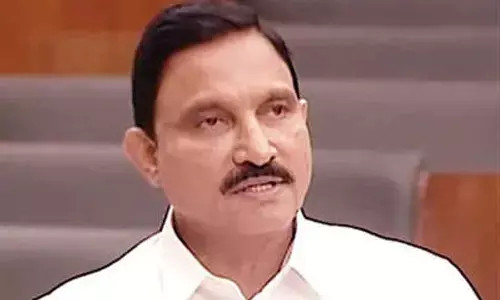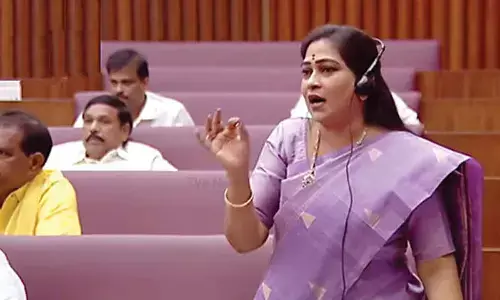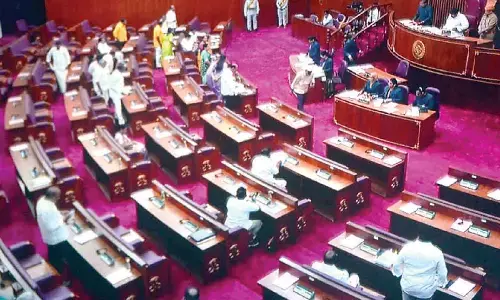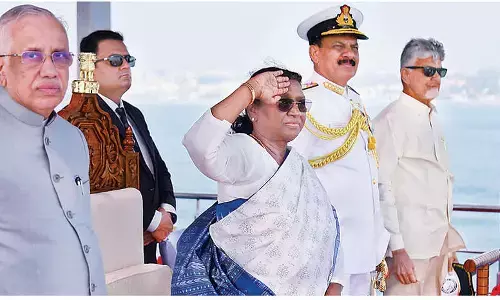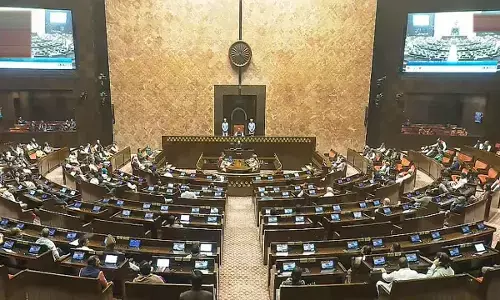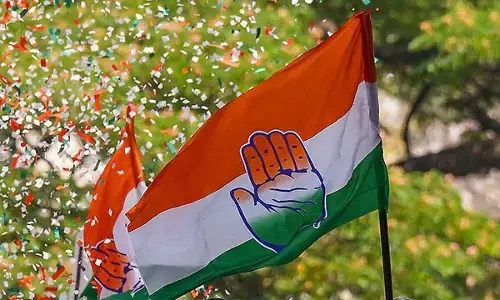Can India beat China in world trade?
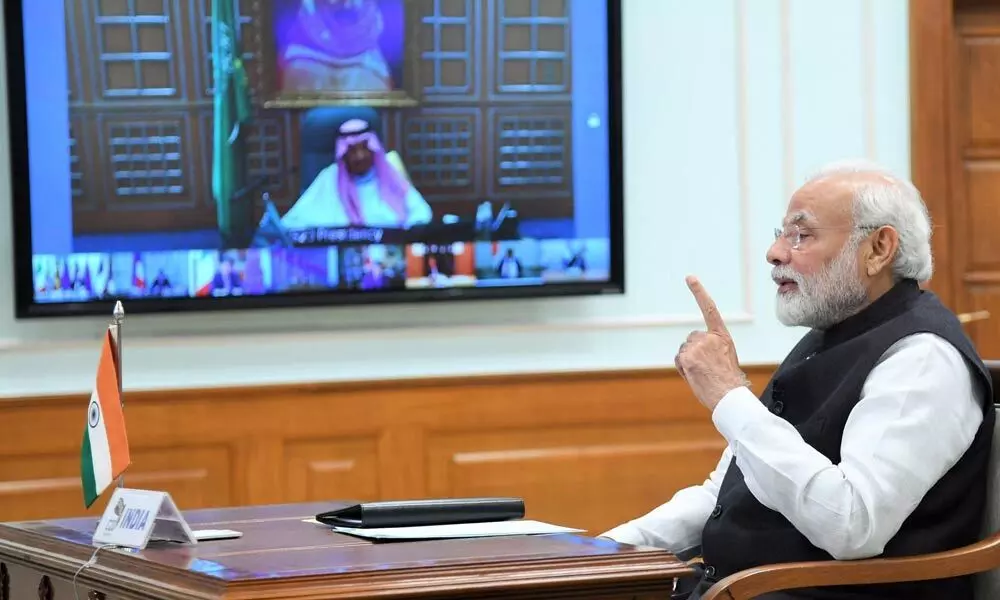 Prime Minister Narendra Modi
Prime Minister Narendra ModiEvery adversity presents an opportunity, and those who are prepared can make good of the same. There has been visible discomfort in the air about China's global trade hegemony and its anti-competition, monopolistic trade practices in recent years, especially from the first world and emerging nations.
Every adversity presents an opportunity, and those who are prepared can make good of the same. There has been visible discomfort in the air about China's global trade hegemony and its anti-competition, monopolistic trade practices in recent years, especially from the first world and emerging nations. Corona crisis originating from China, at a time the world was clearly moving towards a cyclical economic recession, has everyone pointing fingers at this mega manufacturing and trade behemoth. Some nations like Germany and the USA already wanting to penalise China to billions of dollars and others spinning 'bio-war and lab produced virus' conspiracy theories. Whatever the facts may be, China is certainly glaring at a global gang-up against its carefully managed image and trade credibility for decades.
India, like all other nations, is struggling to put up a decisive fight against the dangerous Covid-19 contagion, is equally peeved with China for inadvertently throwing a spanner in the wheels of its resurging economy, after a brief slow-down the last few quarters. However, as India could so far control and manage it from substantive damage, there's a spirited conversation going on at homes and aisles of national government in the locked-down nation, on whether India could unseat China in the global trade and rise up to the occasion, as a viable alternative to the world.
Aspiration is a big driver of results, but preparation and decisive action are bigger. Just aspiration would not get anyone even nearer to this size of a goal. If India aspires to be a viable alternative global trade player to China, the nation should take not just few but many historic and path-breaking policy decisions to steer itself in that direction.
That's exactly what China did in the December of 1982, when it re-constitutionalised its nation in its pursuit to become the world's manufacturing hub. Imagine the conviction behind the aspiration and the massive action taken by Chinese – preparing and executing a new national Constitution, to lead the nation in a new direction. The massiveness of its action has resulted in massiveness of results over decades, which has completely transformed China, its economy and its global standing.
India can never be China, nor can China be ever India. With an exception of the population size, there are not many similarities between these two nations as of now. If India aspires to be a global alternative to China in manufacturing and world trade, it should study China's growth model quite incisively and re-model it to suit India's unique conditions. There is no shame in re-modeling success. India can make amends and customise the macro strategy, where necessary.
Below are few essential path-breaking macro policy decisions India should take to walk the path towards a grand destination.
Ministry of national values
India needs to reinvent and reinforce its national values and propagate effectively amongst its citizens across all socio-economic levels. This is essential for long lasting positive and productive behavioral outcomes. A full-fledged Ministry with necessary budgetary allocations is essential to achieve real outcomes in this foundation-building exercise.
Work culture encompassing professionalism, honesty, quality-consciousness, accountability, skill-up-gradation, punctuality, result-orientation, innovation are some core values to ensure India breeds quality professionals at all levels of its workforce.
There are several other interventions at school, collegiate and at higher professional education level which need to be executed to ensure a steady, quality pipeline for high quality, trained workforce. If India is poised for an exponential rise of industry, its skilled human resource should be reliable and consistent.
There is a massive need for large section of Indian population to shun the mindset of freebies, State dole outs, entitlements and move towards mammoth skilling and personal empowerment for self-reliance. This tendency and a consistent pattern of dependence on the pittance the national and state governments offers for survival, has destroyed the spirit of personal responsibility. The spirit of 'need to work' 'need to skill' and 'need to contribute' amongst millions is slowly fading, especially at the bottom two levels of the pyramid, and can be a critical factor, if India chooses to pursue this mega goal. The large volume of inspired and work-oriented skilled workforce is a primary asset, if India wishes to unleash its manufacturing and trading potential.
This Ministry can design the architecture of unified national goals through unified common values. Imagine the composite and compounding strength of 1.3 billion hands and minds working together in unison, for accomplishing a singular goal of being the world's best and most efficient manufacturer of quality goods and services.
Corruption-free administration & law enforcement
India cannot dream of greatness of any global dimension, leave alone being world's largest manufacturer and trader without having to vaccinate itself from the worst form of contagion called 'Corruption'. A society blinded and numbed to institutionalized corruption in almost all its public institutions, a society which accepts corruption as an integral part of its daily life and considers it as an acceptable norm will not be able to enforce laws of the land neither in letter nor spirit.
Without stringent anti-corruption laws, impeccable and incorruptible enforcement agencies, time-bound and quick legal and judicial outcomes, no nation can deliver credible, authentic and high-quality products and services at a scale required, as a global manufacturer. India should decisively act with massive reforms backed by political will and strong institutional framework.
Corruption corrupts everything. It spreads to be all pervasive and that is certainly cannot be a conducive environment for reliable quality production process and delivery.
Corruption weakens accountability in the entire system. With no accountability - deception, rouge practices, breach of quality standards will become a routine. Without adhering to high quality standards, business accountability, contractual obligations and industry best practices, no nation can be a top global seller.
Continuity of critical national policies
Electoral cycles, transition of power, majority strength, popular politics are both advantageous and disadvantageous in a parliamentary democracy. India being one of the largest functional democracies of the world, can't avail the 'luxury of continuity' of national policies like in a single party ruled communist China. This constitutional limitation will continue to be a challenge for India, unless India formulates a constitutional framework for few 'touch me not - till two decades' kind of national laws and policies to drive massive industrialisation.
Bi-partisan and multi-partisan politics with a singular priority of national Interest, and a mature, accountable political environment with unified national goals, is critical for India's success in this massive endeavor. Despite having differential partisan ideologies, it is a compulsive necessity for Indian polity to come together and work together to achieve this mega goal.
Indian polity should also assimilate the fact, that rapid industrialisation is a necessity and not a luxurious dream for a second largest populous nation with massively wide socio-economic gaps, and inexcusable size of population below the poverty line, even after 70 years of its existence as an independent republic. This new national aspiration backed with strong conviction can decisively eliminate poverty and reduce socio-economic gaps across all levels. The outcomes of even partial success of the grand goal will create millions of new jobs and lead to unprecedented poverty alleviation and social empowerment.
Socialism or capitalism?
China run by Communist Party brands itself as a 'Socialist Republic' with hardly any socialist welfare measures undertaken. In fact, China in practice is more capitalist than any other proclaimed capitalist nations in the world. However, in contrast India has been and continues to be more socialist than another self-proclaimed socialist nation in the world with its real-time socialist policies at the ground level. India has turned new leaves in aggressive socialism, especially in the last few decades. Aggressive socialism paired with aggressive capitalism is a sure shot failure formula economically.
There are clear choices for any nation to make; you are either a Capitalist nation empowering every single individual ensuring personal contribution to build national wealth or a Socialist nation trying to tax the industrious few to feed millions of inherently jobless. While the fundamental social security for the physically challenged and the aged is acceptable, a nation of the size of India can't afford aggressive socialism, especially if India aspires to be a world leader in manufacturing and trade.
(To be continued tomorrow)
(The writer is the chief spokesperson of the BJP Telangana State unit, a global leadership coach and an organisational strategist)

